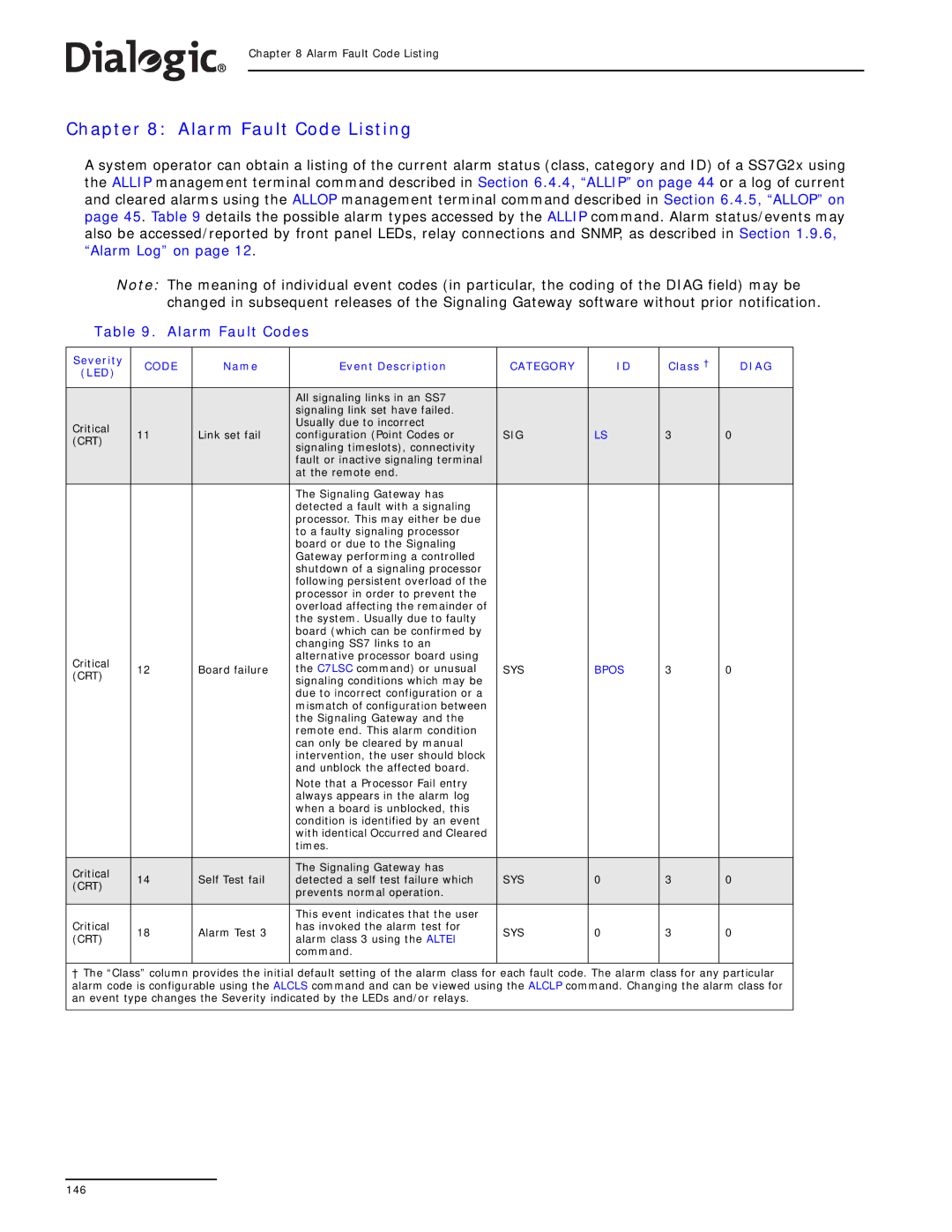
Chapter 8 Alarm Fault Code Listing
Chapter 8: Alarm Fault Code Listing
A system operator can obtain a listing of the current alarm status (class, category and ID) of a SS7G2x using the ALLIP management terminal command described in Section 6.4.4, “ALLIP” on page 44 or a log of current and cleared alarms using the ALLOP management terminal command described in Section 6.4.5, “ALLOP” on page 45. Table 9 details the possible alarm types accessed by the ALLIP command. Alarm status/events may also be accessed/reported by front panel LEDs, relay connections and SNMP, as described in Section 1.9.6, “Alarm Log” on page 12.
Note: The meaning of individual event codes (in particular, the coding of the DIAG field) may be changed in subsequent releases of the Signaling Gateway software without prior notification.
Table 9. Alarm Fault Codes
Severity | CODE | Name | Event Description | CATEGORY | ID | Class † | DIAG | |
(LED) |
|
|
|
|
|
|
| |
|
|
|
|
|
|
|
| |
|
|
| All signaling links in an SS7 |
|
|
|
| |
|
|
| signaling link set have failed. |
|
|
|
| |
Critical |
|
| Usually due to incorrect |
|
|
|
| |
11 | Link set fail | configuration (Point Codes or | SIG | LS | 3 | 0 | ||
(CRT) | ||||||||
|
| signaling timeslots), connectivity |
|
|
|
| ||
|
|
|
|
|
|
| ||
|
|
| fault or inactive signaling terminal |
|
|
|
| |
|
|
| at the remote end. |
|
|
|
| |
|
|
|
|
|
|
|
| |
|
|
| The Signaling Gateway has |
|
|
|
| |
|
|
| detected a fault with a signaling |
|
|
|
| |
|
|
| processor. This may either be due |
|
|
|
| |
|
|
| to a faulty signaling processor |
|
|
|
| |
|
|
| board or due to the Signaling |
|
|
|
| |
|
|
| Gateway performing a controlled |
|
|
|
| |
|
|
| shutdown of a signaling processor |
|
|
|
| |
|
|
| following persistent overload of the |
|
|
|
| |
|
|
| processor in order to prevent the |
|
|
|
| |
|
|
| overload affecting the remainder of |
|
|
|
| |
|
|
| the system. Usually due to faulty |
|
|
|
| |
|
|
| board (which can be confirmed by |
|
|
|
| |
|
|
| changing SS7 links to an |
|
|
|
| |
Critical |
|
| alternative processor board using |
|
|
|
| |
12 | Board failure | the C7LSC command) or unusual | SYS | BPOS | 3 | 0 | ||
(CRT) | ||||||||
|
| signaling conditions which may be |
|
|
|
| ||
|
|
|
|
|
|
| ||
|
|
| due to incorrect configuration or a |
|
|
|
| |
|
|
| mismatch of configuration between |
|
|
|
| |
|
|
| the Signaling Gateway and the |
|
|
|
| |
|
|
| remote end. This alarm condition |
|
|
|
| |
|
|
| can only be cleared by manual |
|
|
|
| |
|
|
| intervention, the user should block |
|
|
|
| |
|
|
| and unblock the affected board. |
|
|
|
| |
|
|
| Note that a Processor Fail entry |
|
|
|
| |
|
|
| always appears in the alarm log |
|
|
|
| |
|
|
| when a board is unblocked, this |
|
|
|
| |
|
|
| condition is identified by an event |
|
|
|
| |
|
|
| with identical Occurred and Cleared |
|
|
|
| |
|
|
| times. |
|
|
|
| |
|
|
|
|
|
|
|
| |
Critical | 14 | Self Test fail | The Signaling Gateway has | SYS | 0 | 3 | 0 | |
detected a self test failure which | ||||||||
(CRT) | ||||||||
|
| prevents normal operation. |
|
|
|
| ||
|
|
|
|
|
|
| ||
|
|
|
|
|
|
|
| |
Critical |
|
| This event indicates that the user |
|
|
|
| |
18 | Alarm Test 3 | has invoked the alarm test for | SYS | 0 | 3 | 0 | ||
(CRT) | alarm class 3 using the ALTEI | |||||||
|
|
|
|
|
| |||
|
|
| command. |
|
|
|
| |
|
|
|
|
|
|
|
|
† The “Class” column provides the initial default setting of the alarm class for each fault code. The alarm class for any particular alarm code is configurable using the ALCLS command and can be viewed using the ALCLP command. Changing the alarm class for an event type changes the Severity indicated by the LEDs and/or relays.
146
